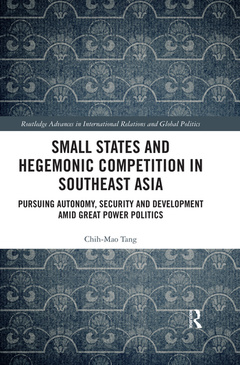Small States and Hegemonic Competition in Southeast Asia Pursuing Autonomy, Security and Development amid Great Power Politics Routledge Advances in International Relations and Global Politics Series
Auteur : Tang Chih-Mao

In the last few decades, Southeast Asia has become generally more peaceful and more prosperous, with progress in economic development, regional cooperation and integration. ASEAN in particular plays a leading role within and beyond the region in promoting multilateral cooperation in both security and economic matters. All these developments progress amid increasing hegemonic competition between the US and China for regional dominance in the Asia-Pacific region. According to the realist viewpoint of international politics, Southeast Asian states can do nothing but choose sides at the expense of international political autonomy in order to maintain their national interests. Tang argues, however, that in fact there exists an opportunity for Southeast Asian states to simultaneously reinforce their military security, economic development and international political autonomy in face of the US-China hegemonic competition.
Drawing on the ideas of power transition theory and recent works of capitalist peace, Tang argues that small states can exploit the competition between great powers to make economic gains and ensure security while maintaining their autonomy. He outlines the necessity of cooperation among these small states and of economic liberalization for the effectiveness of this reinforcing dynamics, applying policy and econometric analyses to a wide range of qualitative and quantitative data.
Acknowledgement
1. Chapter 1: Introduction
2. Chapter 2: Small State’s Autonomy, Security, and Development: A Reinforcing Logic
3. Chapter 3: Southeast Asian States’ Cooperation in the Context of US-China Competition
4. Chapter 4: Pursuit of Economic Development and Southeast Asian Peace
5. Chapter 5: US-China Competition and Southeast Asian States’ International Political and Strategic Autonomy
6. Chapter 6: Conclusion
Index
Chih-Mao Tang is Assistant Professor and Director of Center for Globalization and Peace Research in the Department of Political Science, Soochow University, Taiwan.
Date de parution : 10-2019
15.6x23.4 cm
Disponible chez l'éditeur (délai d'approvisionnement : 14 jours).
Prix indicatif 53,83 €
Ajouter au panierDate de parution : 03-2018
15.6x23.4 cm
Disponible chez l'éditeur (délai d'approvisionnement : 14 jours).
Prix indicatif 160,25 €
Ajouter au panierThème de Small States and Hegemonic Competition in Southeast Asia :
Mots-clés :
Southeast Asian States; Autonomy; ASEAN State; Development; International Political Autonomy; Great Power; ASEAN Economic Community Blueprint; Hegemonic Competition; Subic Bay Naval Base; Politics; Power Transition System; Pursuing; Peaceful Southeast Asia; Security; Re-estimate Model; Small States; ASEAN Multilateralism; Southeast Asia; ASEAN Enlargement; St Century Maritime Silk Road; Southeast Asian Cooperation; Violent Interstate Conflicts; Liberal Capitalist Economic; South China Sea Issue; Alliance Network; Capitalist Peace; Arf Meeting; Aquino III; Strategic Autonomy; Dyad Year; ASEAN’s Performance; Quantitative Empirical Analysis; White Robust Standard Error; Time Series Cross-sectional Dataset



